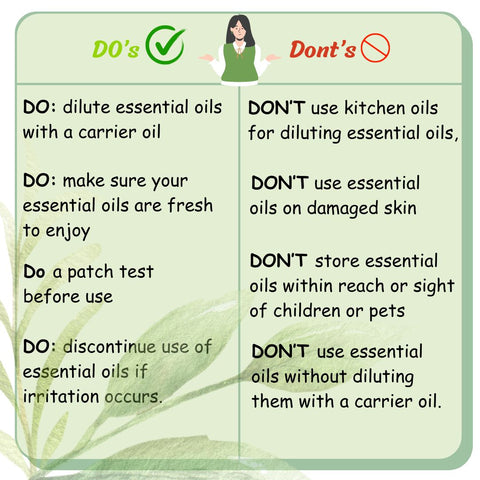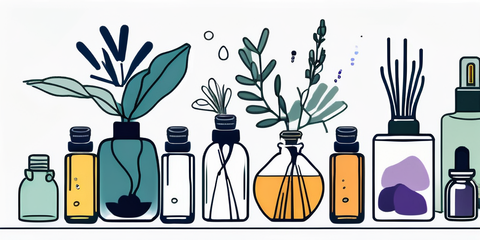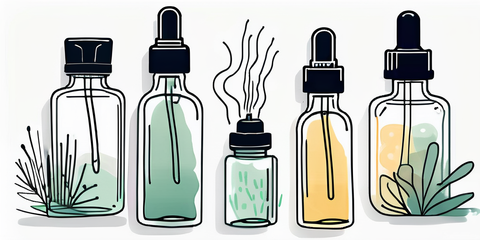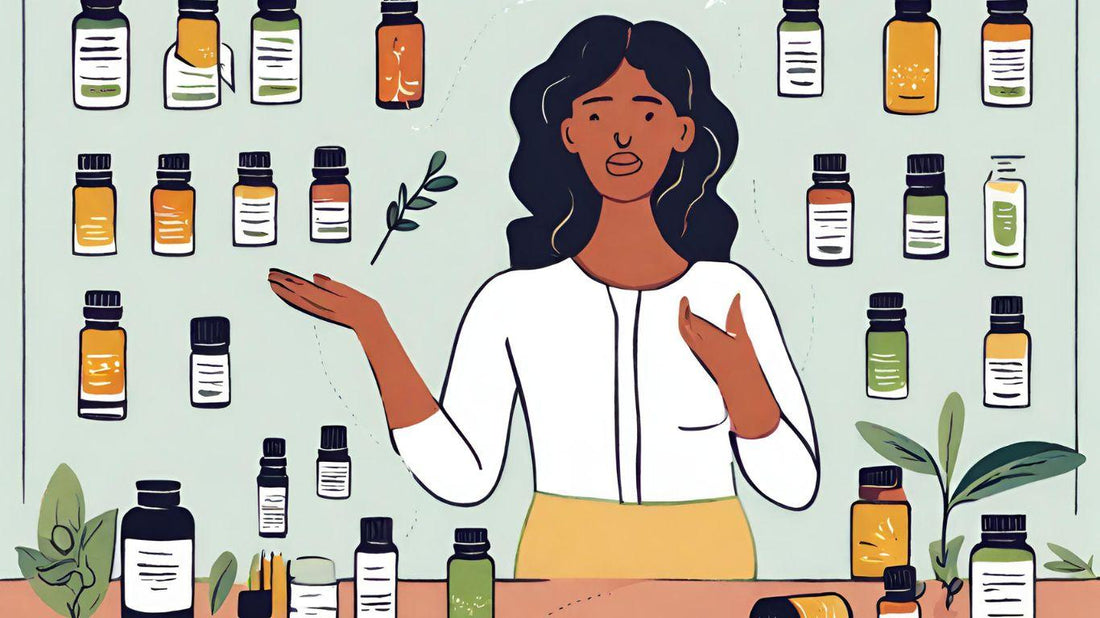Essential oils have gained immense popularity in recent years due to their numerous health benefits and versatile uses. However, it's important to note that these potent oils should be used with caution and proper knowledge.
In this article, we will explore the dos and don'ts of using essential oils to ensure a safe and enjoyable experience. From choosing the right oils to properly diluting them, we'll cover everything you need to know.

Choosing the Right Essential Oils for Your Needs
When it comes to essential oils, one size does not fit all. Each oil has its own unique properties and benefits. Before diving into the world of essential oils, it's crucial to identify your specific needs and goals.
Whether you're looking to relieve stress, boost your immune system, or enhance your skincare routine, there is an essential oil out there for you.
Research different essential oils and their properties to determine which ones align with your needs.
Consider factors such as aroma, therapeutic benefits, and suggested uses. It's also important to purchase high-quality oils from reputable brands to ensure purity and effectiveness.
Let's take a closer look at some popular essential oils and their specific benefits:
Lavender Essential Oil: Known for its calming properties, lavender essential oil is often used to promote relaxation and improve sleep quality. It can also help soothe skin irritations and reduce anxiety.
Peppermint Essential Oil: With its refreshing and invigorating scent, peppermint essential oil is commonly used to relieve headaches and improve focus. It can also aid in digestion and provide a cooling sensation when applied topically.
Tea Tree Essential Oil: Tea tree essential oil is renowned for its antimicrobial properties, making it a popular choice for treating acne and other skin conditions. It can also be used to freshen up your home by adding a few drops to your cleaning products.
Dos and Don'ts of Safe Essential Oil Usage
While essential oils offer numerous benefits, it's essential to use them safely to avoid any adverse reactions. Here are some key dos and don'ts to keep in mind:
- Do: Always perform a patch test before applying any essential oil directly to your skin.
- Do: Dilute essential oils with a carrier oil before applying them topically.
- Do: Follow recommended guidelines for diffusing essential oils to avoid overexposure.
- Do Explore Different Application Methods for Essential Oils
- Do Consider Essential Oil Storage and Shelf Life Guidelines
- Don’t: Forget to Consult Healthcare Professional for using in pregnancy
- Don't: Ingest essential oils unless under the guidance of a qualified aromatherapist.
- Don’t Make Common Mistakes When Using Essential Oils
- Don’t Overlook Purity and Authenticity of Essential Oils
- Don’t Forget Essential Oil Safety Precautions for Children and Pets
Now that you know the basic dos and don'ts of essential oil usage, let's delve deeper into each point to gain a better understanding of why these guidelines are crucial for your safety and well-being.
Do Perform a Patch Test
Performing a patch test is an essential step before applying any essential oil directly to your skin. This simple test involves applying a small amount of diluted oil to a small area of your skin and observing for any adverse reactions such as redness, itching, or irritation.
By conducting this test, you can identify if you have any sensitivities or allergies to a specific oil, allowing you to avoid potential skin problems.
Do Consider Diluting Essential Oils
Diluting essential oils with a carrier oil is another crucial step to ensure safe usage. Carrier oils, such as coconut oil or jojoba oil, help to dilute the potency of essential oils, reducing the risk of skin irritation or burns.
This dilution process also allows for better absorption and distribution of the oil on the skin, maximizing its benefits without overwhelming your body.
Do Follow Recommended Guidelines for Diffusion
When it comes to diffusing essential oils, following recommended guidelines is crucial to prevent overexposure. Overexposure to certain oils, especially in enclosed spaces, can lead to headaches, dizziness, or respiratory issues.
By using diffusers as directed and ensuring proper ventilation, you can enjoy the benefits of essential oils while maintaining a safe environment.
Do Explore Different Application Methods for Essential Oils
There are various ways to incorporate essential oils into your daily routine. Experiment with different application methods to find what works best for you:

- Topical application: Dilute essential oils with a carrier oil and apply to the skin for localized benefits.
- Aromatherapy: Use a diffuser to disperse essential oils into the air for inhalation and mood enhancement.
- Bath soak: Add a few drops of essential oil to your bathwater for a relaxing and aromatic experience.
Do Consider Essential Oil Storage and Shelf Life Guidelines
Proper storage is crucial to preserve the quality and potency of your essential oils. Here are some guidelines to ensure you get the most out of your oils:
- Keep essential oils in dark glass bottles: Exposure to light can degrade the oils. Store them in amber or cobalt glass bottles to protect them from sunlight.
- Avoid exposure to heat and humidity: Heat and moisture can cause the oils to deteriorate. Store them in a cool, dry place away from direct sunlight.
- Check the shelf life: Essential oils have varying shelf lives. Some oils, such as citrus oils, have a shorter shelf life than others. Replace your oils every few years to ensure optimal freshness and effectiveness.
Don’t Neglect Extra Care if Pregnant
Pregnant women should consult with a qualified healthcare professional before using essential oils. Some essential oils can cause contractions. Thus, using essential oils during pregnancy could be risky and should be avoided during pregnancy.
Don’t Ingest Essential Oils
While essential oils can provide aromatic and therapeutic benefits, it's important to note that not all oils are safe for ingestion. Ingesting essential oils without proper knowledge and guidance can lead to serious health complications.
A qualified aromatherapist can provide you with the necessary information and dosage guidelines if you wish to use essential oils internally.
Don’t Make Common Mistakes When Using Essential Oils
Despite their benefits, essential oils can be misused, leading to potential risks or undesirable outcomes. Here are some common mistakes to avoid:
- Overusing essential oils: More is not always better when it comes to essential oils. Using excessive amounts can cause skin irritation or sensitization. Stick to recommended guidelines.
- Using oils without research: Each essential oil has its own safety considerations and usage recommendations. Do your research before using any oil and consult trusted sources.
- Ignoring any adverse reactions: If you experience any negative reactions such as allergic symptoms or skin irritation, discontinue use immediately and seek medical advice if needed.
Don’t Overlook Purity and Authenticity of Essential Oils
The purity and authenticity of essential oils are critical factors to consider when choosing quality oils. Pure essential oils are extracted from plants, and they do not contain any synthetic or artificial ingredients. To ensure that the oil is pure, look for essential oils that are labeled as 100% pure or therapeutic grade. It is also essential to check the botanical name of the oil to ensure that it is the correct species.
Don’t Forget Essential Oil Safety Precautions for Children and Pets

When it comes to using essential oils around children and pets, extra caution is necessary. Some essential oils can be toxic or irritating to their sensitive systems. Here are some safety precautions:
- Avoid diffusing oils constantly: Children and pets need breaks from constant exposure to essential oils. Limit diffusing time and ensure proper ventilation.
- Keep oils out of reach: Store essential oils securely, out of the reach of children and pets.
- Avoid using certain oils: Some oils, such as tea tree and eucalyptus, can be toxic to pets. Research pet-safe oils and consult a veterinarian if unsure.
Tips for Incorporating Essential Oils into Your Daily Routine
Now that you're familiar with the dos and don'ts of essential oil usage, here are some tips to help you seamlessly incorporate them into your daily routine:
- Start slowly: Begin with one or two oils and gradually expand your collection as you become more comfortable and experienced.
- Experiment with oil combinations: Certain essential oils work synergistically when combined. Explore different combinations to create personalized blends.
- Follow recommended usage guidelines: Each essential oil has specific usage guidelines. Adhere to these recommendations for optimal results.
- Trust your senses: Pay attention to how essential oils make you feel and trust your instincts when it comes to choosing oils for different purposes.
Frequently Ask Questions
What are the best practices for using an essential oil diffuser to scent a room?
When using an essential oil diffuser, it is important to follow the manufacturer's instructions carefully. Only use the recommended amount of essential oil, usually 3-5 drops per 100ml of water. Do not leave the diffuser running for extended periods of time, and make sure to clean it regularly to prevent the buildup of bacteria.
Can you list the essential oils that should not be combined?
Some essential oils should not be combined because they can have adverse effects on the body. For example, peppermint and eucalyptus should not be used together because they can cause respiratory issues. Similarly, lavender and rosemary should not be used together because they can cause skin irritation. It is important to research the essential oils you plan to use and ensure that they are safe to combine.
How should I store essential oils to maintain their shelf life?
To store essential oils effectively and extend their shelf life, keep them in a cool, dark place and ensure that the lids are tightly closed to prevent oxidation. Storing them away from direct sunlight and heat is key to preserving their potency.
What are the potential negative effects of using essential oils and how can they be avoided?
Some potential negative effects of using essential oils include skin irritation, allergic reactions, and respiratory issues. These can be avoided by diluting the essential oil with a carrier oil, doing a patch test before use, and avoiding essential oils that are known to cause adverse effects. It is also important to use essential oils in a well-ventilated area and to avoid using them around pets and children.
What are the precautions for using citrus oils topically?
Precautions for using citrus oils topically include diluting them in a carrier oil, performing a patch test to check for sensitivity, and avoiding sun exposure for 12-18 hours after application due to photosensitivity.
Conclusion
By following these guidelines and tips, you can safely and effectively incorporate essential oils into your daily life. Enjoy the benefits of aromatherapy and natural wellness, while avoiding common pitfalls.
Wondering where to buy pure and good quality essential oils? If yes then checkout our variety of 100% pure essential oils.
Remember, when it comes to essential oils, knowledge is power, so educate yourself and embrace the diverse world of botanical scents.

